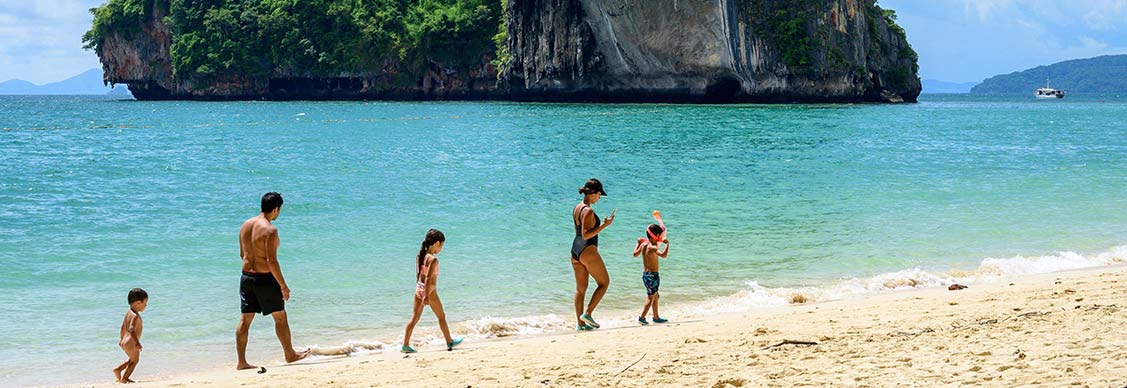Reopening tourist hot spots are drawing investors’ attention
Thailand’s reopening to tourism bolsters optimism among hotel investors in the region
Thailand’s pristine beaches and resorts recently reopened to tourists for the first time since the onset of the pandemic, spurring a shot of optimism for the hotel sector in the country and beyond.
The tourism-reliant economy reopened its borders to international travel this month, waiving mandatory quarantine measures for travellers from more than 60 countries and territories.
Authorities are expecting a slow recovery, with 10 to 15 million visitors expected in 2022, down from some 40 million before the pandemic in 2019. Still, it’s being taken as a positive sign for the hotel investors hunting for opportunities amid pent-up demand, says Mike Batchelor, CEO, Asia Pacific, JLL Hotels & Hospitality Group.
“Thailand has been Southeast Asia’s most active investment sales destination this year,” he says. “The projected recovery in leisure demand, following the recent reopening, is a timely boost of confidence for investors that the tide is finally turning in the pandemic.”
Last year hotel investment dipped alongside other real estate sectors amid general caution around the global economy. But signs of recovery pushed up investment volumes globally in the first nine months of this year.
In APAC, hotel investment volumes are expected to cross US$7 billion this year and US$9 billion in 2022, compared to US$14 billion in 2019, according to JLL’s Hotel Investment Highlights 2H21 report.
Looking for more insights? Never miss an update.
The latest news, insights and opportunities from global commercial real estate markets straight to your inbox.
“The Asia Pacific hotels industry is well primed for an investment resurgence that will gather momentum in 2022,” Batchelor says. “While Covid-19 will continue to impact the industry and influence capital deployment, investors are increasingly viewing the current environment as an opportunistic time to get deals done.”
One of the largest deals recorded in the region this year was Kintetsu Group Holdings’ US$550 million sale of eight Japanese hotels to US investment fund Blackstone Group.
Resurgence in key resort markets
While the top three markets — China, Japan, and Australia — accounted for more than two-thirds of transactions in Asia Pacific this year, leisure travel destinations such as Thailand and Maldives are also seeing an upswing in interest from investors looking to take advantage of the post-Covid travel recovery.
In October, Hawaii-based premier beach-resort brand Outrigger Hospitality Group acquired three beach resorts under Manathai Hotels & Resorts in Thailand to expand its portfolio in the Asia-Pacific region.
Within the same month, Italy-based luxury resort group Emerald Collection extended its investment foray in Asia Pacific with its purchase of the Faarufushi Maldives resort from Maldivian hospitality operator Universal Enterprises.
“In our interactions, buyers are viewing the external backdrop as the start of a new investment cycle for the hotels space,” says Nihat Ercan, Senior Managing Director, Head of Investment Sales, Asia Pacific, JLL Hotels & Hospitality Group.
Global private equity players, as well as corporate and high net worth (HNW) investors from the Middle East, have become more engaged in leisure travel destination markets, based on JLL’s research.
Tourism, new cross-border capital driving investments
An influx of cross-border capital is often coming from new investors with little prior exposure to the real estate sector, including family offices and groups from Europe and the Middle East. Recent research showed that 87 percent of European institutional investors expect to increase their allocation to Asia Pacific real estate sector over the next two years.
And signs suggest the growth is underway. Thailand emerged as one of the top locations in the region alongside Australia and Japan, with record amounts of foreign capital raised for real estate investment this year, according to JLL.
As for Thailand’s November reopening, the news is turning interest toward the country’s popular beach destinations such as Ko Samui and Phuket, which piloted a sandbox program to resume international tourism in July.
The relaxation of travel curbs in Thailand, where tourism accounted for one-fifth of its GDP pre-pandemic, comes at an opportune moment ahead of the year-end holidays when more international travellers are expected to set foot in the Southeast Asian nation.
JLL estimates that hotel investments in the country are on track to reach US$300 million in 2022, representing a year-on-year increase of more than 400 percent.
"Finally, hoteliers see the light at the end of the tunnel and are eager and excited for the opening," says Marisa Sukosol Nunbhakdi, president of the Thai Hotels Association. “There is now hope, not just for owners and operators, but for the employees as well.”
Contact Mike Batchelor
CEO, Asia Pacific, JLL Hotels & Hospitality GroupWhat’s your investment ambition?
Uncover opportunities and capital sources all over the world and discover how we can help you achieve your investment goals.
